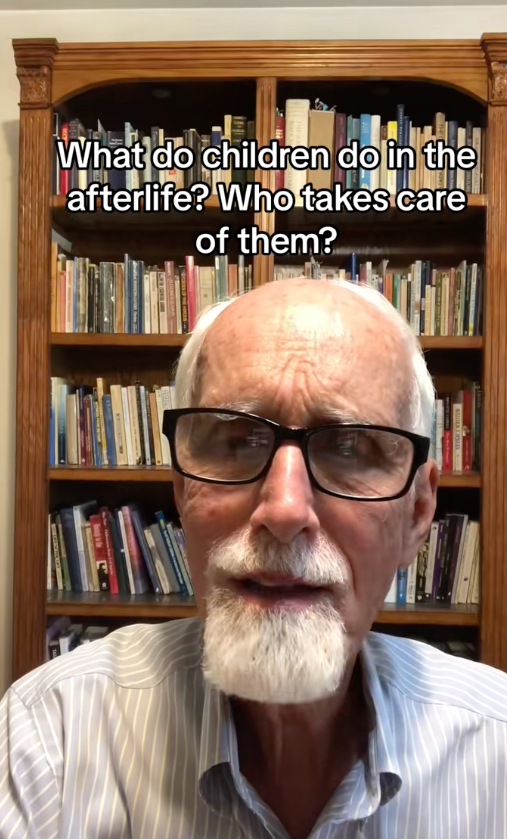What are the lives of children like in the astral world following their early death? Do they go to school? Are they happy? Do they play and have fun? Are they eventually reunited with a mom or dad? Who takes care of them? There isn’t as much in spirit literature as I’d like, but let’s look at what we have.
In one account a woman who has just died is eager to find her son. He died some years before, and she is led to a children’s school, where he has lived ever since. When she sees him, her joy is too great for words. The child is eager to show her around. He leads her about the school and the grounds and shows her all his favorite places. He introduces her to his schoolmates. His face, like hers, is beaming with delight.
In another account a newly deceased woman is taken to a children’s home where a husband a wife who have stayed together, take care of babies who were stillborn or died soon after birth. These tiny ones are nursed in a manner different from children who have lived longer and, quote, “have fought and developed in the earth battle of life.”
Leslie Stringfellow, a Texan who died at twenty, tells his mother there are homes for children of all ages. “Today,” he says, “we visited one situated in an immense grove of trees, and the buildings covered a space of ground as large as a small town. This was for small children under seven and eight years. Older ones have other homes, where they go after leaving these more junior ones. The children are watched over and cared for by the most beautiful motherly spirits who in their earth-life were especially fond of children.”
Leslie, not much older than a child himself, enjoys playing with children. On December 25, 1889, he organized a Christmas activity. He materialized a Christmas tree and supervised a party complete with music he composed, and presents to give to the kids. He describes the scene: “Well, we had our tree. It was ornamented with jewels as well as toys, and we had little images of all kinds of birds and beasts. … The children all stood around and sang beautiful Christmas hymns, and when all the presents were off the tree, we dematerialized it, and it melted away into a green vapor, and disappeared.”
On another occasion Leslie and his friends attended a school outing. Sitting under trees, they delighted in telling the kids stories of earth. “I told them all about the flood in Galveston in the hurricane of 1886, when I went down and got the ducks. And about the snakes, about my boat, and the pears my family grew and sold, and what astonished them most was that we raised pears ‘to sell.’ These children had not known earth-life, and here, as you know, all is free. When we told them money was little round pieces of metal, they could not understand why anyone wanted it, and we had to laugh at their curious questions.” It would be a mistake to think that heaven can’t be fun!
For souls who die as children, Leslie continues, “there are no violent changes. The little ones grow up … about as gradually and imperceptibly as they would have grown on earth. The tendency is to fulfill the normal rhythm, though there are instances where the soul goes back to earth very soon, with little rest. That would be a soul with great curiosity and strong desires.”
He continues, “Our children are educated in every branch of knowledge and those who have special tastes for music, painting and other accomplishments are given every opportunity to cultivate these talents. … In talking to these little ones, it was easy to tell those who had had no earth life or experience. They seemed more spiritual, but not so sympathetic and affectionate, as the others who had known a mother’s love on earth. … Not in this whole Spirit World is there a child who would for a moment think of wishing to leave this bright and happy home, in exchange for the pains and sorrows of your world.”
Judge David Hatch, a California lawyer in earth life, had a friend who called him Father. “The boy, named Lionel, had died six years before at the age of seven, and now he was eager to go back to earth. He had even elected his mother-to-be, a woman who had always been good to him and was a friend of his former mother. He wanted to become an engineer.” Hatch’s reaction is interesting: “It is strange about this boy. In this world there is boundless opportunity to work in subtle matter, opportunity to invent and experiment; yet he wants to get his hands on iron and steel.” Apparently, Lionel wanted to go back to earth because he desired a greater challenge than the astral world provided. That’s why many of us are here now: to encounter and enjoy difficulties, “as a swimmer enjoys the resistance of water,” Hatch said.
As hundreds of spirits speaking to us through mediums tell us, we grow our souls by challenging them. Most of us are too primitive to appreciate the higher challenges available in the upper astral environment. We are not ready for them; they would puzzle or bore us in the same way that pop music enthusiasts are puzzled or bored by Mozart or Mahler. So we descend to earth to encounter challenges we understand. That’s why we came to earth in the first place. The boy Lionel, with his iron and steel, seemed to understand this.
Stafford Betty, Professor of Religious Studies, CSUB, (ret) is the author of When Did You Ever Become Less by Dying?and Heaven and Hell Unveiled. His latest novel, Guardians of the Afterworld is published by White Crow Books.
Stafford can be found at staffordbetty.com.

